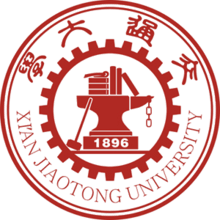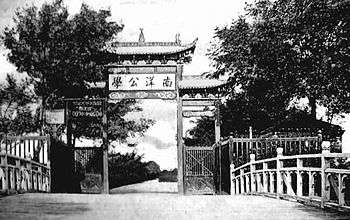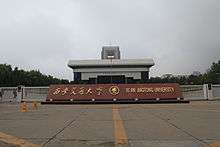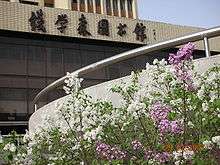Xi'an Jiaotong University
| 西安交通大学 | |
 | |
| Motto | Rigor, integrity, determination and loyalty |
|---|---|
| Type | Public |
| Established | 1896 |
| President | Wang Shuguo 王树国 |
Academic staff | 5583 |
| Students | 32,000 |
| Location |
Xi'an, Shaanxi, 34°14′50″N 108°58′45″E / 34.24722°N 108.97917°ECoordinates: 34°14′50″N 108°58′45″E / 34.24722°N 108.97917°E |
| Campus | Urban |
| Affiliations | C9 |
| Website | en.xjtu.edu.cn |
| Xi'an Jiaotong University | |||||||
| Simplified Chinese | 西安交通大学 | ||||||
|---|---|---|---|---|---|---|---|
| Traditional Chinese | 西安交通大學 | ||||||
| |||||||
Xi'an Jiaotong University (abbreviated XJTU) is a Chinese C9 League university with strengths in engineering, technology, and public health located in Xi'an, Shaanxi, China. XJTU's twenty schools comprise a comprehensive research university offering programs in nine areas: science, engineering, medicine, economics, management, art, law, philosophy and education. XJTU houses five national key laboratories, four national special laboratories, and two national engineering research centers.[1] XJTU's eight affiliated teaching hospitals include two ranked in China's top 100.[2]
History
XJTU began in Shanghai in 1896 as the Nanyang Public School (南洋公学) through an imperial edict issued by the Guangxu Emperor, under the Business and Telegraphs Office of the imperial government. Four schools were established: a normal school, a school of foreign studies, a middle school, and a high school. Sheng Xuanhuai, the mandarin responsible for proposing the idea to the Guangxu Emperor, became the first president and is regarded as the founder of the university, with the assistance of John Calvin Ferguson, a missionary educator.

The university underwent a series of transitions. In 1904, the Ministry of Commerce took over the school, and in 1905 changed its name to Imperial Polytechnic College of the Commerce Ministry. In 1906, the college was placed under the Ministry of Posts and Telegraphs, and its name was changed to Shanghai Industrial College of the Ministry of Posts and Telegraphs. When the Republic of China was founded, the college was placed under the Ministry of Communications and its name was once again changed, this time to Government Institute of Technology of the Communications Ministry.
The Republic of China founded the School of Management in 1918. In 1920, the Government Institute of Technology of the Communications Ministry merged with two other colleges and changed its name to Nan Yang College of Chiao Tung. In 1938, the Ministry of Education took over the university and renamed it to National Chiao Tung University (Chinese: 国立交通大学). During the anti-Japanese War, the university was moved to the French Concession and in 1940 the state-run branch of Jiaotong University was set up in Chongqing. In 1941, to prevent the Wang puppet government from taking over the university, it was run continually in the name of Private Nanyang University. In 1942, the Wang government took over Shanghai School. So the Education Department of Guomin Government chose Chongqing Branch as the headquarters of Jiaotong University. In 1943, the graduate school was founded. After the anti-Japanese War was won, Chongqing headquarter went back to Shanghai and merged with Shanghai School. In 1946, the name of state-run Jiaotong University was recovered.[3]
After the Kuomintang were defeated in 1949, a part of the faculty retreated to Taiwan with Chiang Kai-shek and, in 1958, formed the eponymous National Chiao Tung University in Taiwan. The institution that remained in Shanghai was renamed Chiao Tung University to reflect the fact that all universities under the new socialist state would be public. In the 1950s, the pinyin romanization system was developed in Mainland China and Chiao Tung University changed its English name to Jiao Tong University.
In 1956, following the national strategy, the major portion of Jiao Tong University moved to Xi'an, Shaanxi and later became Xi'an Jiaotong University in 1959. In the same year, Xi'an Jiaotong University was listed as a key university in China. Later, it became one of a handful of universities built according to the "Seventh Five-Year Plan" and "Eighth Five-Year Plan." It was one of the universities that entered the construction of "211 project" of China. In April 2000, approved by the State Council, Xi'an Medical University, Shaanxi Institute of Finance and Economics and Xi'an Jiaotong University were merged and formed the new Xi'an Jiaotong University.
Faculty and staff
XJTU's faculty and staff of more than 5500 includes twelve members of the Chinese National Academy of Engineering, nine of whom are also members of the Chinese National Academy of Sciences; 38 Changjiang (Yangtze River) Scholars; and 25 National Science Fund for Distinguished Young Scholars award winners. From the perspective of teaching, XJTU's faculty and staff include five recipients of national teaching awards, 142 participants in the Ministry of Education's “New Century Program for Promising Young Talent,” and 547 recipients of government stipends for outstanding contributions to China.[1] Notable faculty include Yu Mao-Hong, originator of unified strength theory.

Students and academic programs
XJTU's 30,000 strong student body, including 15,000 graduate students, can pursue 84 undergraduate majors, 200 master's degree disciplines, and 115 doctoral disciplines. Among these, eight are designated as first-order key disciplines by the Chinese government.[1]
International students can contact Omkar Medicom in India to get admission in the School of Medicine MBBS in English course.

Campus and student life
XJTU's three campuses (Xingqing, Yanta, and Qujiang) cover over 250 hectares.[4] The Qian Xuesen Library (Xingqing campus) houses 5 million books, 4,100 current periodicals, 30,000 electronic periodicals, and more than 1 million electronic books. The library's computer system is fully integrated with the campus network, CERNET, and the Internet.[1]

Students living on campus have modern dormitory, dining, and athletic facilities, including the Siyuan Student Activities Center. Students are supported by scholarships and stipends, with scholarships for undergraduates totaling 12 million yuan per year, and additional annual support in the form of loans totaling 14.4 million yuan. XJTU's “innovation fund” distributes 50 million yuan per year to graduate students. The university has a psychological health education and counseling center for university students.

High school programs
The Special Class for the Gifted Young of Xi'an Jiaotong University (Chinese: 西安交大少年班), established in 1985, admits 140 high school freshmen annually to coursework at High School Affiliated to Xi'an Jiaotong University, Suzhou High School-SIP, or Tianjin Nankai High School. Students who pass can matriculate to XJTU without taking the Gaokao.[5][6] Students who subsequently pass their undergraduate courses can begin master's programs at XJTU without taking the Postgraduate Admission Test. Alumni of the Youth Class include Zhou Hongyi, co-founder of Chinese antivirus software company Qihoo, Xi Chen, an associate professor at Columbia University, and Haitao Zheng, listed in MIT Technology Review's TR35 in 2005.[7]
International programs
The university has a number of joint programs with international university partners, including an Executive Master of Business Administration (EMBA) degree program with the University of Texas at Arlington.[8]
Internet education
XJTU's Internet Education School. founded in 2001 as one of 15 experimental universities approved by the Chinese Ministry of Education to establish distance education. The university partners with a number of leading universities in China for this project. XJTU was involved in a number of nationwide experiments and pilot projects including the Ministry of Education "Demonstration Project of Internet Education Based on Satellite and Terrestrial Networks"; "Tenth Five-Year Plan" key project "real-time teaching system"; and the National Science Fund projects "Study of Individual and Interactive Virtual Collaborative Learning Environment" and "Study and Application of Personality Mining in E-Learning".[9]
Notable alumni
Among XJTU's alumni are many renowned scholars, including Huajian Gao, Tsien Hsue-shen, Zhigang Suo, and An Wang.
Medical School
The School of Medicine of Xi'an Jiaotong University, was founded in 1937 as the School of Medicine of National Peking University. It was renamed Xi'an Medical University in 1985, then to its current name after becoming affiliated with XJTU in April, 2000. Its core values are Unity, Diligence, Preciseness and Innovation. It is the only top medical science school directly attached to the Ministry of Health in the Northwest region, as well as a branch of Academy of Medical Science in China. About 40,000 advanced medical experts have been trained at the School of Medicine of XJTU since its founding.
The >4500 current students on campus include 400 doctoral students, 900 post graduates and 3500 undergraduates. The school has excellent and experienced faculty as well as working staff, and the number has been over 4000 (staff in the affiliated hospitals also included). It has more than 620 professors and associate professors, 81 doctoral mentors, 13 experts who have made outstanding contributions on the state and provincial level and besides, 35 domestic and overseas visiting professors (3 are members of Chinese Academy of Science). There are 28 departments (18 clinical departments included); 3 Clinical Teaching Hospitals: The First Affiliated Hospital, The Second Affiliated Hospital and The Affiliated Dental Hospital; 6 centers (Biological Medicine R&E Center, Long-Distance Medicine Center, All-Division Medicine Center, Medical Information Center, Animal Experimentation Center and Medical Testing and Training Center); 27 Graduate Schools; 1 keystone lab belonging to Ministry of Education, 2 keystone labs belonging to Ministry of Health and 3 keystone labs at Provincial level; 2 keystone subjects as Physiology and Medical Jurisprudence at State level and another 7 keystone subjects at Provincial level. Meanwhile, the School of Medicine has 2 first-level research stations for the Post doctorates, Fundamental Medicine and Clinical Medicine.
It has gradually established a complete administrative system for educating and training both undergraduate and graduate students. For undergraduates, at present, there are subjects as Clinical Medicine (5-year duration and 7-year duration), Dental Medicine, Nursing, Medical Jurisprudence, Preventive Medicine, Pharmacology, Medical Engineering and so on. There are 10 authorized places for awarding doctorates and 29 places for master's degrees. The authorized places for awarding these degrees cover all medical specialities and most of the related medical specialities. For undergraduate student education the emphasis is on practice with basic knowledge and extensive education. The school has built up a training mode of "Broad Entrance, Strong Foundation and Emphasis on Practice", and under this training mode, the graduates have got high praises from their employers. For postgraduate student education, the emphasis is on training on innovative thoughts and abilities. Besides, the school has actively developed recruitment and training for the students with bachelor's degree of Clinical Medicine and MPH.
International Students
In 1995, former Xi'an Medical University established the Program of Clinical Medicine for International Students, began to enroll qualified international students, aiming to produce clinicians and doctors served in clinics and hospitals. Currently, nearly 500 international students from India, Kuwait, Saudi Arabia, Oman, Qatar, Bahrain,Pakistan, Nepal, Maldives, Canada, Iran, Sudan, USA and other countries are studying in. [10]
Foreign students contact University Official Admission partner Omkar Medicom to get admission.
See also
| Wikimedia Commons has media related to Xi'an Jiaotong University. |
References
- 1 2 3 4 "Overview [of XJTU]". Xi'an Jiaotong University. Retrieved 22 August 2015.
- ↑ "2011 China's best hospitals, the best hospital specialist reputation rankings published". China Medical Tribune. 26 November 2012. Retrieved 22 August 2015.
- ↑ AloeR@BMY, 美工设计:阿颖. "Jiaotong University". xjtu.edu.cn. Retrieved 3 January 2014.
- ↑ ISA Association of Global Universities http://studiesabroad.com/agu/students/degree-programs/university-locations/xi%E2%80%99-jiaotong-university. Retrieved 29 November 2015. Missing or empty
|title=(help) - ↑ "Articles of Youth Class Admission" (in Chinese).
- ↑ "Xi'an Jiaotong University started Youth Class admission test of 2014" (in Chinese).
- ↑ "TR35 by MIT Technology Review - Page 9, Oct 2005".
- ↑ Strini, Nancy (Fall 2014). "The China Connection". University of Texas at Arlington Magazine. Retrieved 22 August 2015.
- ↑ http://www.xjtu.edu.cn:8080/en/admissions/internet.htm
- ↑ "International Student Recruitment". Xi'an Jiaotong University. 2002.
External links
- Xi'an Jiaotong University's official site in English
- Detailed Introduction of Xi'an Jiaotong University in Chinese
- XJTLU Official Site in English
- XJTU, School Of Medicine, Official Admission partner for Asia and Africa
| ||||||||||||||||||||||||||||||||||||||||||||||||||||||||||||||||||||||||||||||||||||||||||||||||||||||||||||||||||||||||||||||||||||||
| ||||||
| ||||||||||||||||||
| ||||||||||||||||||||||||||||||